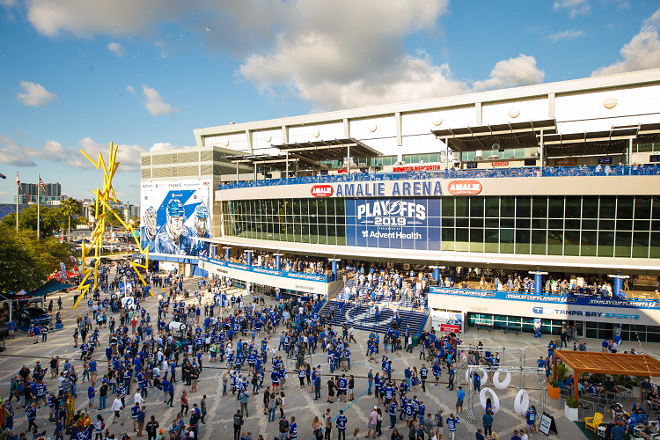Sorry basketball fans, but novel coronavirus is here to officially give you the bracket blues.
On Wednesday afternoon, NCAA President Mark Emmert announced that March Madness games happening as part of the NCAA’s Division I men's basketball tournament will be played “with only essential staff and limited family attendance.”
That includes opening round games scheduled to take place on March 19 and 21 at Tampa’s Amalie Arena.
“While I understand how disappointing this is for all fans of our sport, my decision is based on the current understanding of how COVIC-19 is progressing in the United States,” said NCAA president Mark Emmert in a statement. “This decision is in the best interest of public health, including that of coaches, administrators, fans and, most importantly, our student-athletes.
“We recognize the opportunity to compete in an NCAA national championship is an experience of a lifetime for the students and their families. Today, we will move forward and conduct championships consistent with the current information and will continue to monitor and make adjustments as needed.”
Creative Loafing Tampa Bay is waiting on a press release from Amalie Arena regarding refunds, but the economic impact of the now fan-less games will be interesting.
According to Forbes, the local economy in Providence, Rhode Island generated $3.5 million when 2016’s opening round games were played at the Dunkin' Donuts Center. By comparison, Wallethub says that Atlanta—which is hosting the Final Four in 2020—could see an economic impact of more than $106 million.
Not to mention all the already booked hotels and Airbnbs.
And how the hell are we supposed to get an upset without fans in the damn building?
Here's the full statement from the NCAA:
The NCAA COVID-19 Advisory Panel recognizes the fluidity of COVID-19 and its impact on hosting events in a public space. COVID-19 is spreading rapidly in the United States, and behavioral risk mitigation strategies are the best option for slowing the spread of this disease. This is especially important because mildly symptomatic individuals can transmit COVID-19. Given these considerations, coupled with a more unfavorable outcome of COVID-19 in older adults – especially those with underlying chronic medical conditions – we recommend against sporting events open to the public. We do believe sport events can take place with only essential personnel and limited family attendance, and this protects our players, employees, and fans.
This is a developing story, and we'll update it as more information is available.
NCAA President Mark Emmert statement on limiting attendance at NCAA events: https://t.co/GrPbmZx5N6 pic.twitter.com/PFFh9htixR
— Inside the NCAA (@InsidetheNCAA) March 11, 2020
Follow @cl_tampabay on Twitter to get the most up-to-date news + views. Subscribe to our newsletter, too.


